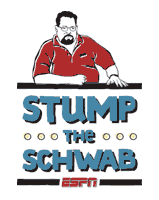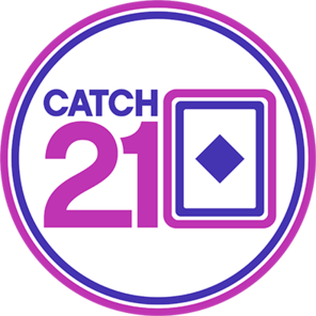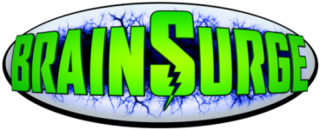Related Research Articles

Who Wants to Be a Millionaire – Play It! was a game show taping mock-up at Disney's Hollywood Studios theme park at Walt Disney World Resort in Orlando, Florida and Disney California Adventure at Disneyland Resort in Anaheim, California. The attraction was a modified version of the Who Wants to Be a Millionaire television game show.

Winston Conrad "Wink" Martindale is an American disc jockey, radio personality, game show host, and television producer. In his six-decade career, he is best known for hosting Gambit from 1972 to 1976, Tic-Tac-Dough from 1978 to 1985, High Rollers from 1987 to 1988, and Debt from 1996 to 1998.
Idiot Savants was an American television game show on the MTV network which ran from December 9, 1996 to April 25, 1997. It was created by Michael Dugan and Chris Kreski, directed by Steve Paley, and hosted by comedian Greg Fitzsimmons.
Inquizition is an American game show created by Game Show Network and Sande Stewart Television that ran on the network's schedule from October 5, 1998 to October 19, 2001.

Stump the Schwab is an American game show that aired on ESPN2 and ESPN Classic from July 8, 2004 to September 29, 2006. The show featured three contestants trying to defeat Howie Schwab, ESPN's first statistician, in a sports trivia contest. Stuart Scott was the show's host. The show also appeared on Canada's The Score Television Network.

Debt is an American game show hosted by Wink Martindale which aired on Lifetime from June 3, 1996, to August 14, 1998. The show featured contestants who were trying to earn money to get out of debt.
BrainTeaser was a British game show based on the original Dutch format of Puzzeltijd, first broadcast in 2002 produced by Endemol UK subsidiary Cheetah Productions.

The Big Showdown is an American game show that aired on the ABC television network from December 23, 1974 to July 4, 1975. Jim Peck hosted the program and Dan Daniel served as announcer.
Trivial Pursuit is an American game show that ran on The Family Channel from June 7, 1993, to December 30, 1994. Loosely based on the board game of the same name, it was hosted by Wink Martindale with Randy West announcing.

Miljoenenjacht, officially Postcode Loterij Miljoenenjacht, is a Dutch game show, sponsored by the country's postcode lottery, where a contestant and at-home viewer could win up to €5,000,000 or as little as €0.01. The show is broadcast at various times, spanning across six episodes for each set. The program was originally shown by TROS on NPO 2, but moved to creator John de Mol's channel Tien in 2005. After the channel was discontinued after its sale to the RTL Group, the program moved to RTL 4. In 2019, the program moved to SBS6 due to the transfer of Linda de Mol from RTL to SBS.
PDQ and Baffle are American television game shows created by Heatter-Quigley Productions. Both shows' objective was for contestant/celebrity teams to guess a given word or phrase in the shortest amount of time with the fewest letters given as possible.

Uh Oh! is a Canadian television game show that was created by Rick Watts and Frank Young. Following a sneak preview at YTV Psykoblast on August 16, Uh Oh! aired from August 22, 1997 to April 19, 2003 on YTV, and was a spin-off of the popular variety show It's Alive!, which also aired on YTV. Uh Oh! was part of It's Alive's game show segment during its third season, but existed as a parody during its second season. As of 2019, Uh Oh! is the third longest-running show on YTV, behind Hit List and Video & Arcade Top 10, both of which aired for 14 and 15 years respectively. For its entire run, Uh Oh! was taped at Global Television in Toronto, Ontario. The series ended on April 19, 2003.
Boggle is an American game show that was broadcast on The Family Channel from March 7 to November 18, 1994. It was based on the board game of the same name. Wink Martindale was the host, and Randy West was the announcer.
The Great Getaway Game is a game show which aired on The Travel Channel from June 1, 1990 to April 1991, producing 39 episodes. This was, to date, the network's sole attempt at a game show. Its pilot was hosted by Jim Caldwell, but Wink Martindale took over as host for the actual series, in addition to producing it.
Jumble is an American game show that was broadcast on The Family Channel, running from June 13 to September 2 and from November 21 to December 30, 1994. It is hosted by Wink Martindale, with Randy West as the announcer.
Rumor Has It was an American daily game show that aired on the cable channel VH1 from June 7 to October 28, 1993. Brian O'Connor was the host and John Ten Eyck announced.

Catch 21 is an American game show broadcast by Game Show Network (GSN). Created by Merrill Heatter, the series follows three contestants as they play a card game centered on blackjack and trivia. The show is based on a popular online game from GSN's website and aired for four seasons from 2008 to 2011. It was hosted by Alfonso Ribeiro, with actress Mikki Padilla serving as the card dealer.

BrainSurge is an American children's game show that aired on Nickelodeon and was hosted by Jeff Sutphen. The show taped its first season in February 2009, and debuted on September 28, 2009. The show's format was adapted from the Japanese game show Brain Survivor. The U.S. version was created by Scott A. Stone, co-creator of Legends of the Hidden Temple, and Clay Newbill, executive producer of The Mole.
Wipeout was an Australian game show that aired on the Seven Network from 15 February 1999 to 24 November 2000. The show was based on the original American series of the same title and was hosted by Tony Johnston. This version was the only one to use children as contestants, and in turn used points instead of dollars due to a law in Australia and Europe which prohibits children from winning money on game shows. After the show was cancelled, it was rerun until 2004.
Family Game Night was an American television game show based on Hasbro's family of board games and EA's video game franchise of the same name. The show was hosted by Todd Newton. Burton Richardson announced for the first two seasons, until he was replaced by Stacey J. Aswad for the third season, and then Andrew Kishino beginning in the fourth season. The 60-minute program debuted on October 10, 2010, on The Hub, formerly Discovery Kids. The network would become Discovery Family on October 13, 2014; it was previewed on October 9, 2010, on its sister channel, TLC. Seasons 1 and 2 each contained 26(1) and 30(2) episodes. Seasons 3, 4 and 5 each contained 15 episodes. Season two premiered on Friday, September 2, 2011, and additional games were added. The games added to the second season included Cranium Brain Breaks, Green Scream, Ratuki Go-Round, Simon Flash, Operation Sam Dunk, Trouble Pop Quiz, and Spelling Bee. However, games from the previous season were still kept.